
Facets
Scope & Guideline
Exploring the Dimensions of Scientific Inquiry
Introduction
Aims and Scopes
- Interdisciplinary Research:
The journal emphasizes research that integrates various disciplines, including ecology, social sciences, and health sciences, to address complex environmental and societal challenges. - Sustainability and Conservation:
'Facets' consistently publishes articles focused on sustainability practices, biodiversity conservation, and the management of natural resources in the context of climate change and human impacts. - Community Engagement and Indigenous Knowledge:
The journal highlights the importance of community-based research and incorporates Indigenous knowledge systems, recognizing their value in ecological management and conservation efforts. - Health and Well-being:
Research on the health impacts of environmental changes, particularly in relation to food security, mental health, and community resilience, is a core focus area. - Policy Analysis and Governance:
'Facets' aims to analyze and critique environmental policies and governance frameworks, offering insights into best practices and areas for improvement.
Trending and Emerging
- One Health Approach:
The integration of human, animal, and environmental health under the One Health framework is gaining traction, as seen in recent papers exploring the interconnectedness of ecosystems and public health. - Indigenous and Local Knowledge Integration:
There is a growing emphasis on incorporating Indigenous knowledge and community perspectives in research, reflecting a trend towards decolonizing methodologies and enhancing the relevance of studies to local contexts. - Resilience and Adaptation Strategies:
Emerging themes focus on resilience and adaptive capacity in the face of environmental change, particularly in fisheries and ecosystem management, highlighting the need for innovative solutions. - Social Determinants of Health in Environmental Contexts:
Research exploring the links between environmental factors and social determinants of health is increasingly prevalent, addressing how environmental degradation impacts marginalized communities. - Technology and Citizen Science:
The use of technology and citizen science in environmental monitoring and data collection is on the rise, indicating a trend towards collaborative approaches that engage the public in scientific research.
Declining or Waning
- Traditional Fisheries Management:
There appears to be a decline in research focused solely on conventional fisheries management practices, with a noticeable shift towards more integrated and adaptive management approaches that consider ecosystem dynamics and community involvement. - Single-discipline Studies:
The journal is moving away from studies that focus on single disciplines without interdisciplinary collaboration, as the need for integrated perspectives becomes more recognized in addressing complex environmental issues. - Generalized Climate Change Impacts:
While climate change remains a significant theme, there is a waning focus on generalized impacts without specific contextualization, as researchers are increasingly addressing localized and specific climate adaptation strategies.
Similar Journals

Frontiers in Conservation Science
Unleashing Knowledge for Effective Conservation StrategiesFrontiers in Conservation Science, published by Frontiers Media SA in Switzerland, is an esteemed open-access journal dedicated to advancing research in the field of conservation science. With an E-ISSN of 2673-611X, this journal aims to facilitate the exchange of knowledge among researchers, professionals, and students by publishing high-quality, peer-reviewed articles that explore innovative solutions to contemporary conservation challenges. Since its establishment in 2020, the journal has rapidly ascended to a Q2 ranking in the Nature and Landscape Conservation category, reflecting its commitment to impactful scholarship, as evidenced by its Scopus rank of #93 out of 211 in Environmental Science and a 56th percentile ranking. By promoting open access, Frontiers in Conservation Science ensures that vital research is widely disseminated, fostering collaboration and informed decision-making in the conservation community. This journal is a crucial platform for those dedicated to understanding and preserving our planet's biodiversity and landscapes.
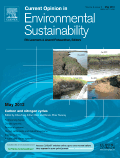
Current Opinion in Environmental Sustainability
Championing Collaboration in Sustainability ScienceCurrent Opinion in Environmental Sustainability, published by Elsevier Science Ltd, is a leading academic journal that specializes in exploring innovative strategies and emerging trends in environmental sustainability. With an impressive impact factor that reflects its esteemed position within the field, this journal is classified as Q1 in both the Environmental Science and Social Sciences categories for 2023, indicating its high-quality and influential contributions. The journal has been at the forefront of sustainability discussions since its inception in 2009 and continues to provide a platform for multidisciplinary research and critical analysis. As a key resource for researchers, professionals, and students alike, Current Opinion in Environmental Sustainability ensures open access to valuable insights while fostering collaboration and knowledge sharing across various domains. This journal not only serves to inform and inspire but also aims to address the pressing challenges of sustainability in our evolving world, making it an essential read for anyone engaged in environmental studies.

Regional Environmental Change
Illuminating the Path to Sustainable Regional SolutionsRegional Environmental Change, published by SPRINGER HEIDELBERG, is a leading journal dedicated to the critical field of Environmental Science, specifically focusing on the global and planetary changes affecting our regional environments. Since its inception in 2005 and continuing through 2024, the journal has been a pivotal platform for disseminating cutting-edge research, insights, and methodologies that address pressing environmental issues. With an impressive Scopus rank, placing it in the top 30% of journals in its category, Regional Environmental Change (ISSN: 1436-3798; E-ISSN: 1436-378X) showcases high-quality academic articles that engage with the multifaceted impacts of environmental shifts, providing researchers, professionals, and students with vital knowledge and data. Although the journal does not currently offer Open Access, it remains a crucial resource for those committed to understanding and mitigating the effects of environmental change on regional ecosystems and communities.

Journal of Environmental Studies and Sciences
Championing rigorous research in environmental studies.Journal of Environmental Studies and Sciences, published by SPRINGER, serves as a pivotal platform for advancing the field of environmental science and related disciplines. With an ISSN of 2190-6483 and E-ISSN of 2190-6491, this esteemed journal has established itself as a reputable source of knowledge since its inception in 2011. Covering an expansive range of topics related to environmental studies, the journal has achieved a commendable position within the academic community, evidenced by its 2023 category quartiles, ranking in the Q2 tier for both Environmental Science (miscellaneous) and Geography, Planning and Development. The journal's Scopus rankings further highlight its impact within the fields of Geography, Planning and Development, and General Environmental Science, boasting a respectable percentile rank of 69th and 58th respectively. Although it does not currently offer Open Access, the Journal of Environmental Studies and Sciences remains an essential resource for researchers, professionals, and students aiming to explore critical environmental issues, engage with innovative research, and contribute to sustainable development practices. Its ongoing commitment to academic rigor ensures that it continues to play a vital role in shaping the discourse around environmental challenges and solutions.
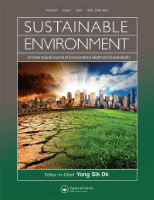
Sustainable Environment
Exploring the frontiers of sustainability research.Sustainable Environment, published by Taylor & Francis Ltd, is a pioneering journal dedicated to advancing the field of sustainability studies. Since its inception in 2021, this open-access journal has sought to provide a platform for multidisciplinary research that addresses pressing environmental challenges and sustainable practices. With a commitment to disseminating high-quality research swiftly, Sustainable Environment aims to engage researchers, policymakers, and practitioners across various domains, fostering scholarly dialogue and innovation. The journal covers a broad range of topics, including climate change, resource management, and sustainable development, making it a vital resource for anyone looking to contribute to and understand contemporary environmental issues. With its flexible access options, readers from all backgrounds can benefit from the latest insights and findings in sustainability research, thereby promoting a more sustainable future.
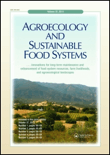
Agroecology and Sustainable Food Systems
Advancing sustainable practices for a resilient future.Agroecology and Sustainable Food Systems, published by Taylor & Francis Inc, is a premier academic journal dedicated to advancing the science of agroecology and its applications in sustainable food systems. With an impact factor that reflects its significant influence in the field, this journal serves as a vital resource for researchers, industry professionals, and students engaged in sustainability, agriculture, and environmental studies. As of 2023, it proudly holds a Q1 ranking in Agronomy and Crop Science, as well as Q2 rankings in Development and Renewable Energy, Sustainability, and the Environment categories. Covering a broad spectrum of topics, it not only shares peer-reviewed research but also encourages discourse on innovative practices and policies that enhance food security and ecological balance. Available for access through various options including Open Access, the journal's commitment to knowledge dissemination is further underscored by its substantial rankings on Scopus, with notable percentiles across multiple disciplines. By focusing on agroecological principles and their socio-economic implications, Agroecology and Sustainable Food Systems is essential for those looking to stimulate meaningful change in agricultural practices and sustainability initiatives worldwide.

PACIFIC CONSERVATION BIOLOGY
Fostering innovative strategies for a sustainable future in conservation.PACIFIC CONSERVATION BIOLOGY is an esteemed academic journal published by CSIRO PUBLISHING, dedicated to advancing research in the fields of ecology and nature conservation. With a strong focus on the unique challenges and biodiversity of the Pacific region, this journal serves as a crucial platform for researchers, conservationists, and students alike to disseminate high-quality, impactful findings. Operating from Australia, it has become a significant resource since its inception in 1993, navigating through nearly three decades of vital scholarly communication. Ranked in the Q2 category for both Ecology and Nature and Landscape Conservation as of 2023, PACIFIC CONSERVATION BIOLOGY maintains rigorous standards, as reflected in its successful Scopus rankings. The journal plays a pivotal role in addressing pressing ecological issues and fostering innovative conservation strategies, making it an essential reference for anyone involved in environmental science. Access options for the journal facilitate widespread distribution of knowledge, supporting the mission to promote informed decision-making in conservation practices.

Journal of Integrative Environmental Sciences
Empowering research at the intersection of environment and health.Journal of Integrative Environmental Sciences, published by Taylor & Francis Ltd, stands as a pivotal platform for researchers and professionals in the fields of Environmental Science and Public Health. With an impact factor reflecting its significance in the academic community, this Open Access journal has been democratizing access to cutting-edge research since 2016, enhancing visibility and dissemination of vital insights. The journal covers a wide scope, converging studies from 2010 to 2024, and holds esteemed rankings in Q2 quartiles for Environmental Science and Public Health, indicating its substantial contribution to these critical fields. With Scopus rankings placing it favorably among its peers, researchers benefit from a diverse array of articles addressing pressing environmental and health issues, sustainability, and renewable energy. As an essential resource for advancing knowledge and fostering innovation, the Journal of Integrative Environmental Sciences encourages contributions that span interdisciplinary approaches to solving some of the most challenging environmental dilemmas of our time.
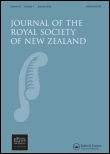
JOURNAL OF THE ROYAL SOCIETY OF NEW ZEALAND
Connecting Ideas, Inspiring DiscoveriesWelcome to the JOURNAL OF THE ROYAL SOCIETY OF NEW ZEALAND, a prestigious multidisciplinary publication hosted by Taylor & Francis Ltd. Since its inception in 1971, this journal has served as a vital platform for disseminating groundbreaking research across diverse fields, from the natural sciences to the humanities, contributing to its strong ranking within the top quartile (Q1) of multidisciplinary journals. With an impressive Scopus ranking of #28 out of 171 and an 83rd percentile placement, the journal is recognized for its high-quality contributions that advance knowledge and innovation. Though it currently does not offer Open Access options, its comprehensive scope and impactful publications make it an essential resource for researchers, professionals, and students alike, striving to push the boundaries of discovery and understanding. As we continue to progress through 2024, we invite you to engage with our diverse array of articles that reflect the vibrant research landscape of New Zealand and beyond.
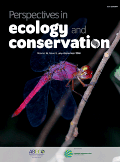
Perspectives in Ecology and Conservation
Championing open access to empower conservation efforts worldwide.Perspectives in Ecology and Conservation, published by Elsevier Science Ltd, is a leading academic journal dedicated to advancing the fields of ecology, conservation, and environmental management. With a Q1 ranking in multiple categories, including Ecology, Management, Monitoring, Policy and Law, and Nature and Landscape Conservation, this journal boasts an impressive standing among its peers, making it essential reading for researchers and professionals. Since its inception in 2017 and running through 2024, it aims to provide innovative perspectives and critical analyses that enhance our understanding and practices in conservation science. The journal is accessible through open access options, facilitating broader dissemination of knowledge. Its commitment to addressing contemporary ecological challenges reinforces its importance in the academic community, promoting sustainable practices and informed policy-making in the face of urgent environmental issues.